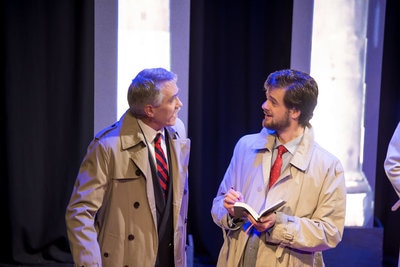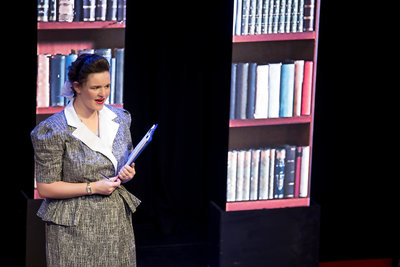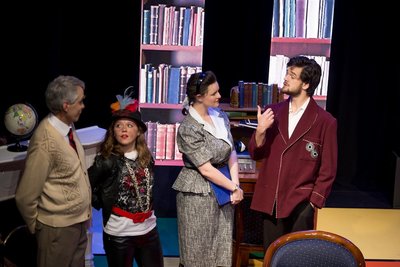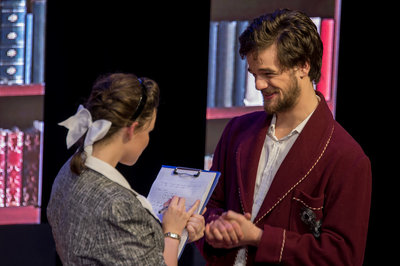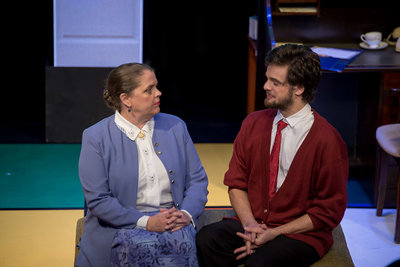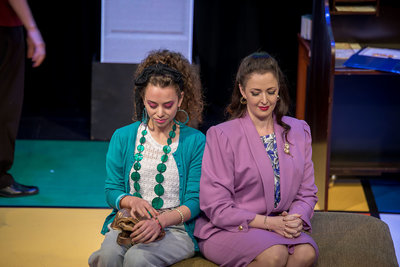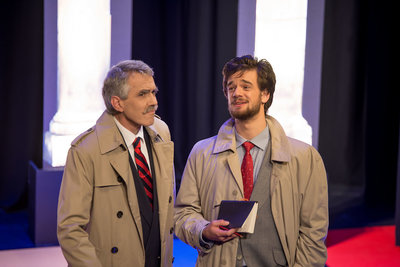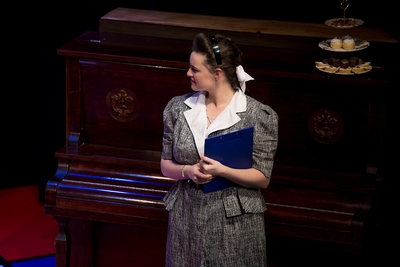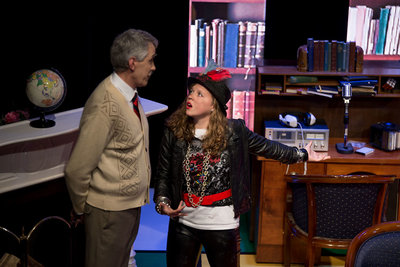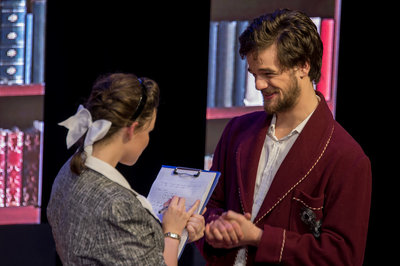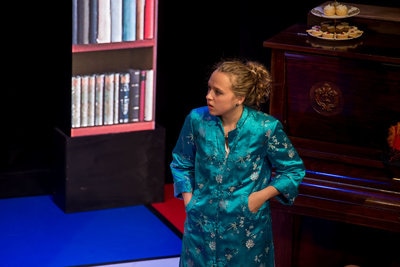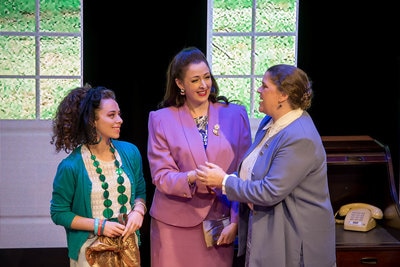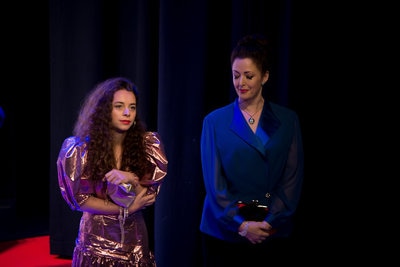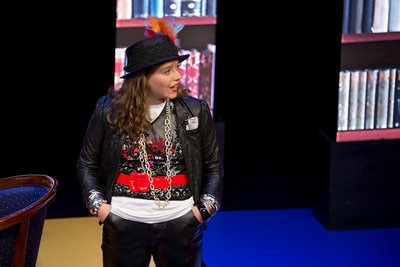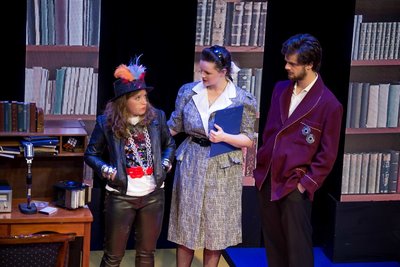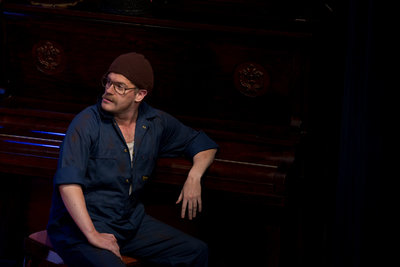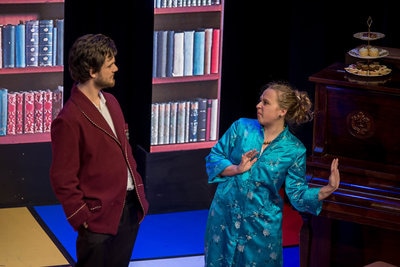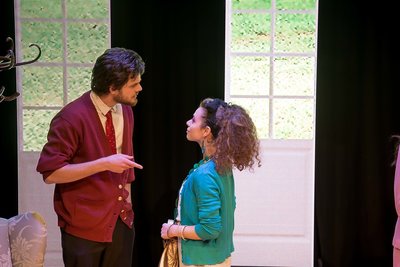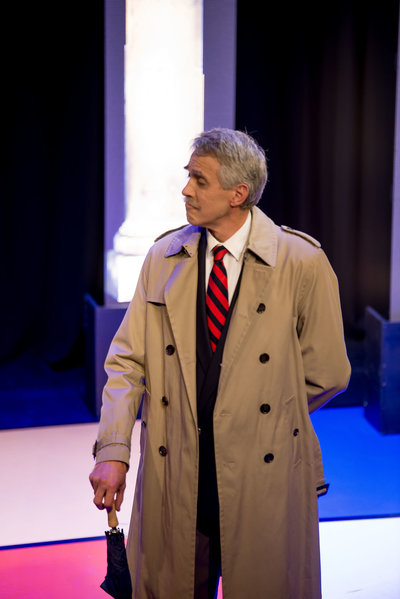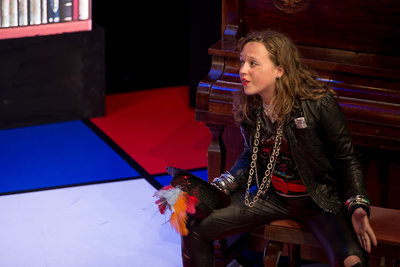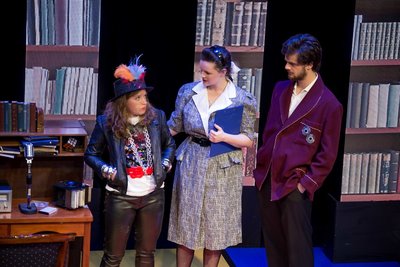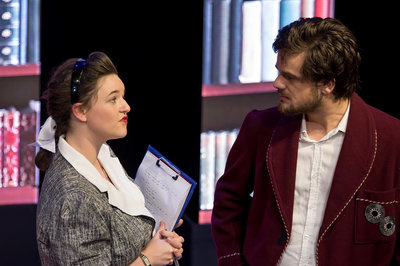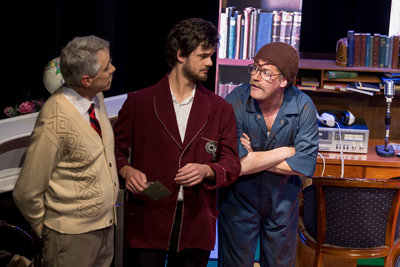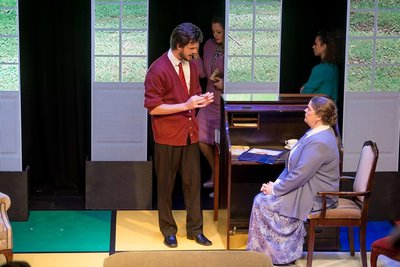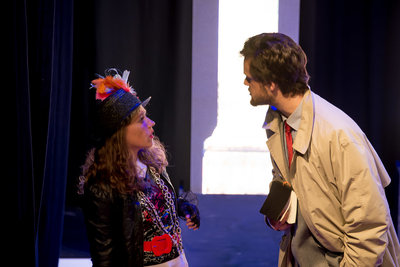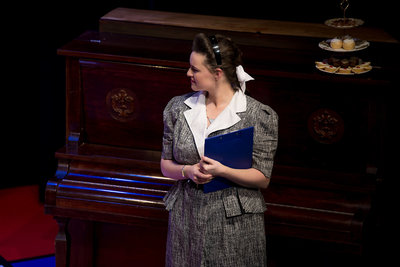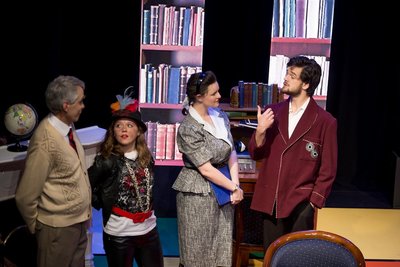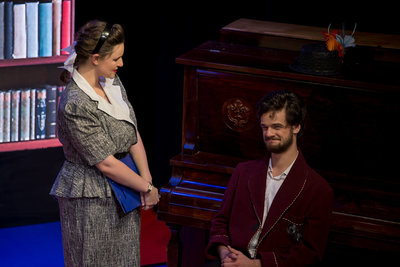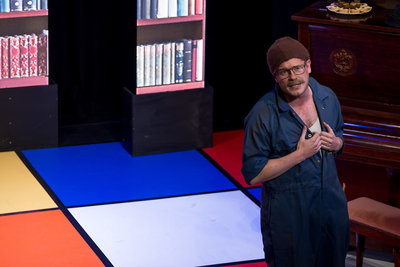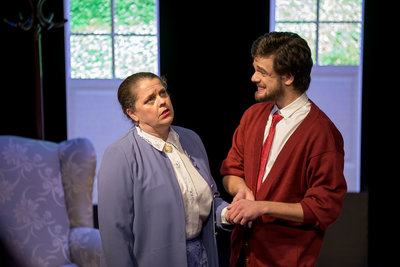We connect you with the top talents, celebrities, organsations and businesses in the world.
Happy reading!
Happy reading!
PYGMALION by 3D ARTS. THIRD DOORS THEATRE and DONCASTER PLAYHOUSE 2017
website
website
Interview with Cale MacLauren, production director
by Bryanna Reynolds
BR: What inspired you to choose Pygmalion as a play to direct?
CM: Pygmalion is a story about the power of language and about the misconceptions we have about others based on where they come from and how they sound. It is also a story about change and the transformative power of knowledge and the divine nature of words. I was inspired by a quote; 'Language is the foundation of civilization, it is the glue that holds people together and the first weapon drawn in a conflict". I wanted to see how this classic play, written over 100 years ago, could still speak to a contemporary audience. It is not a romantic comedy, like My Fair Lady, but a biting and witty comedy of manners which satirises the upper middle class and the ideal of romance. Shaw himself went through a similar metamorphosis to Eliza, our protagonist, and based his story on the inequities and hypocrisy of the ruling upper middle class of his day and sought to bring about social change by giving a voice to the voiceless. He was a brilliant linguist and a fierce social reformer who fought for women's rights and equality, and through the character of Eliza, he makes a stinging criticism of social mores that hold people back from advancing in society. Eliza's primal want is to be independent, and while the audience may not be happy with the ending, it is the ending that Shaw wanted his audience to see. I was inspired by other heroines of the last century, particularly from the 1980's and began to see a trend with Margaret Thatcher (who received elocution lessons to lower the register of her voice so that she would appeal more to the common people) and Princess Diana, a shy and softly spoken school teacher who became immortalized as a social activist and the People's Princess. I wanted my Eliza to begin as the street urchin Madonna like figure of the early 80's, (Madonna meaning literally "my lady") and end as the figurehead for women's independence made in the image of Lady Diana.
by Bryanna Reynolds
BR: What inspired you to choose Pygmalion as a play to direct?
CM: Pygmalion is a story about the power of language and about the misconceptions we have about others based on where they come from and how they sound. It is also a story about change and the transformative power of knowledge and the divine nature of words. I was inspired by a quote; 'Language is the foundation of civilization, it is the glue that holds people together and the first weapon drawn in a conflict". I wanted to see how this classic play, written over 100 years ago, could still speak to a contemporary audience. It is not a romantic comedy, like My Fair Lady, but a biting and witty comedy of manners which satirises the upper middle class and the ideal of romance. Shaw himself went through a similar metamorphosis to Eliza, our protagonist, and based his story on the inequities and hypocrisy of the ruling upper middle class of his day and sought to bring about social change by giving a voice to the voiceless. He was a brilliant linguist and a fierce social reformer who fought for women's rights and equality, and through the character of Eliza, he makes a stinging criticism of social mores that hold people back from advancing in society. Eliza's primal want is to be independent, and while the audience may not be happy with the ending, it is the ending that Shaw wanted his audience to see. I was inspired by other heroines of the last century, particularly from the 1980's and began to see a trend with Margaret Thatcher (who received elocution lessons to lower the register of her voice so that she would appeal more to the common people) and Princess Diana, a shy and softly spoken school teacher who became immortalized as a social activist and the People's Princess. I wanted my Eliza to begin as the street urchin Madonna like figure of the early 80's, (Madonna meaning literally "my lady") and end as the figurehead for women's independence made in the image of Lady Diana.
photos: Glen Wilson at GW Photography and Onstage Pix
BR: How long does it take to stage a production of this size from conception through to performances on stage?
CM: We rehearse three times a week for approximately two months with the cast, but our creative process is usually begins a few months earlier with production teams planning and bringing together all the various production elements.
BR: How did you first get into directing?
CM: I trained as an actor and have always enjoyed working on both sides of the boards. I continue to act to try to further understand what makes good directing, and try to employ the learns from acting into my process as a director. Directing is a craft that I am continually learning to do better. The director needs to be the expert on the world of the play, but needs to empower an actor to be the expert on their character, providing the framework of understanding and the keys to unlock discoveries about their character's needs and wants. An actor is an artist and needs to be given a canvass to paint on. The director provides the tools, techniques, and textures with which an actor creates. The most rewarding part of being a director is to see my creative convictions and artistic vision come to life and to stand inside the world of the play.
CM: We rehearse three times a week for approximately two months with the cast, but our creative process is usually begins a few months earlier with production teams planning and bringing together all the various production elements.
BR: How did you first get into directing?
CM: I trained as an actor and have always enjoyed working on both sides of the boards. I continue to act to try to further understand what makes good directing, and try to employ the learns from acting into my process as a director. Directing is a craft that I am continually learning to do better. The director needs to be the expert on the world of the play, but needs to empower an actor to be the expert on their character, providing the framework of understanding and the keys to unlock discoveries about their character's needs and wants. An actor is an artist and needs to be given a canvass to paint on. The director provides the tools, techniques, and textures with which an actor creates. The most rewarding part of being a director is to see my creative convictions and artistic vision come to life and to stand inside the world of the play.
BR: How do you handle audience feedback, do you learn from past experiences and productions?
CM: The measures of success for creative types are often very different. I learnt early on as a theatre maker and artist that I needed to have a clearly defined set of success criteria and strongly rooted personal convictions which means I can identify when a project is successful. I choose to listen to a very select group of voices, and try to understand that theatre, like any art, is a taste based medium - not everyone is going to enjoy the same dish. I try to keep in mind that theatre is made to be a shared experience - it is not just for an audience. As a performer, we have a responsibility first to ourselves and the text, then the other on stage, and then to transmit that experience to make it personal for the audience. If all three dimensions are at work, theatre is spontaneous, immediate and living.
BR: What are your future goals personally in the arts industry and for Third Door Theatre?
CM: I want to see young and emerging artists become people of deep conviction, character and competence. I believe the Arts builds cultural capital and it is the Artists that will build the next chapter in our history. I want our actors to be the best at their craft, supremely well trained, but also selfless and others focused. I want the industry to be anti-exploitative, to stop scaling itself by just the measures of financial and critical success. I see a form of theatre that feels like extended family. Some families come together at the holidays, and don't see each other much throughout the year, but when they do come together, they share an unbreakable bond and a shared culture that is distinct and wonderful. Theatre is like an extended family.
BR: What do you hope audiences will experience when they see Pygmalion?
CM: I want the ending to stick. The whole play has been building to that moment and whilst we may not want that ending, it is the ending that we need to see. I hope that audiences see this as a story about language and our preconceptions of others, courage and vulnerability, but ultimately strength, rather than a romantic comedy. It's hilarious at moments, but like any good satire, makes us examine the cause of our laughter and brings us out changed.
CM: The measures of success for creative types are often very different. I learnt early on as a theatre maker and artist that I needed to have a clearly defined set of success criteria and strongly rooted personal convictions which means I can identify when a project is successful. I choose to listen to a very select group of voices, and try to understand that theatre, like any art, is a taste based medium - not everyone is going to enjoy the same dish. I try to keep in mind that theatre is made to be a shared experience - it is not just for an audience. As a performer, we have a responsibility first to ourselves and the text, then the other on stage, and then to transmit that experience to make it personal for the audience. If all three dimensions are at work, theatre is spontaneous, immediate and living.
BR: What are your future goals personally in the arts industry and for Third Door Theatre?
CM: I want to see young and emerging artists become people of deep conviction, character and competence. I believe the Arts builds cultural capital and it is the Artists that will build the next chapter in our history. I want our actors to be the best at their craft, supremely well trained, but also selfless and others focused. I want the industry to be anti-exploitative, to stop scaling itself by just the measures of financial and critical success. I see a form of theatre that feels like extended family. Some families come together at the holidays, and don't see each other much throughout the year, but when they do come together, they share an unbreakable bond and a shared culture that is distinct and wonderful. Theatre is like an extended family.
BR: What do you hope audiences will experience when they see Pygmalion?
CM: I want the ending to stick. The whole play has been building to that moment and whilst we may not want that ending, it is the ending that we need to see. I hope that audiences see this as a story about language and our preconceptions of others, courage and vulnerability, but ultimately strength, rather than a romantic comedy. It's hilarious at moments, but like any good satire, makes us examine the cause of our laughter and brings us out changed.
PYGMALION
(Third Door Theatre)
review Glen Wilson
Pygmalion, George Bernard Shaw`s classic Novel Is given a fresh make over thanks to the Third Door Theatre.
For anyone not familiar with this classic play, just think of My Fair Lady - the musical version.
Opening night nerves were a little apparent in the casts opening scene, which soon faded and team shone with this brilliant and fun production.
By the second act, the cast really clicked and produced a captivating performance to rival some of the best productions I’ve seen.
Thalia Dudek takes the leading role as Eliza Doolittle .
Thalia handles her role brilliantly with a great Cockney accent, showing her ability to transform from cockney street kid to a fine young lady.
Thalia really shows her strength as an actor in some of the more dramatic scenes.
Ben Taylor - Henry Higgins.
Ben puts an entire new twist on Professor Higgins. As a pompous arrogant professor he is great.
As a spoilt brat – particularly in the scenes with his mother ( Played by Jenny Silalhi) is where Ben is a show stealer.
Ben`s character and facial expressions, had me thinking… what if Sheldon Cooper (Big Bang Theory) played Higgins.
Stephen Bennie as Colonel Pickering gives an excellent performance along with Sarah Hartnell – Miss Pearce and Mark Briggs as Eliza`s father Alfred.
Third Door Theatre bring a fresh approach to this well loved classic, combining humor along with great dramatic acting.
If you get a chance, go along for a great evening’s entertainment.
Glen, GW Photography.
(Third Door Theatre)
review Glen Wilson
Pygmalion, George Bernard Shaw`s classic Novel Is given a fresh make over thanks to the Third Door Theatre.
For anyone not familiar with this classic play, just think of My Fair Lady - the musical version.
Opening night nerves were a little apparent in the casts opening scene, which soon faded and team shone with this brilliant and fun production.
By the second act, the cast really clicked and produced a captivating performance to rival some of the best productions I’ve seen.
Thalia Dudek takes the leading role as Eliza Doolittle .
Thalia handles her role brilliantly with a great Cockney accent, showing her ability to transform from cockney street kid to a fine young lady.
Thalia really shows her strength as an actor in some of the more dramatic scenes.
Ben Taylor - Henry Higgins.
Ben puts an entire new twist on Professor Higgins. As a pompous arrogant professor he is great.
As a spoilt brat – particularly in the scenes with his mother ( Played by Jenny Silalhi) is where Ben is a show stealer.
Ben`s character and facial expressions, had me thinking… what if Sheldon Cooper (Big Bang Theory) played Higgins.
Stephen Bennie as Colonel Pickering gives an excellent performance along with Sarah Hartnell – Miss Pearce and Mark Briggs as Eliza`s father Alfred.
Third Door Theatre bring a fresh approach to this well loved classic, combining humor along with great dramatic acting.
If you get a chance, go along for a great evening’s entertainment.
Glen, GW Photography.
SUNDAY June 25 (Twilight Show) 5.00pm - LAST performance!
TICKETS
www.trybooking.com/PWDU
or 0404 844 179
All inquiries (including group bookings) email [email protected]
DONCASTER PLAYHOUSE
679 Doncaster Rd, Doncaster
CAST & CREATIVES
BEN TAYLOR, THALIA DUDEK, STEPHEN BENNIE, JENNY SILALAHI, MARK BRIGGS, SARAH HARTNELL, LARA BIANCA PILCHER, MELODY SPRATLEY, STEVEN SPRATLEY
DIRECTED BY CALE MACLAREN & KRYSTAL WALLIS
TICKETS
www.trybooking.com/PWDU
or 0404 844 179
All inquiries (including group bookings) email [email protected]
DONCASTER PLAYHOUSE
679 Doncaster Rd, Doncaster
CAST & CREATIVES
BEN TAYLOR, THALIA DUDEK, STEPHEN BENNIE, JENNY SILALAHI, MARK BRIGGS, SARAH HARTNELL, LARA BIANCA PILCHER, MELODY SPRATLEY, STEVEN SPRATLEY
DIRECTED BY CALE MACLAREN & KRYSTAL WALLIS
Bohemian Rhapsody Club and Online Magazine is expressing its special thanks to the troupe of the theatre for the stunning production and personally to Cale MacLauren for his time during the interview, personally to Colette MacLaren for the opportunity to cover the play , to Glen Wilson for his priceless work (review and photos) and to Bryanna Reynolds for the interview
Glen Wilson at GW Photography & onstage
Bryanna Reynolds / Bryanna Reynolds Multimedia Journalist & Producer at Reynolds Sister Productions
Glen Wilson at GW Photography & onstage
Bryanna Reynolds / Bryanna Reynolds Multimedia Journalist & Producer at Reynolds Sister Productions
|
Unique visitors:
|
|
|
|

